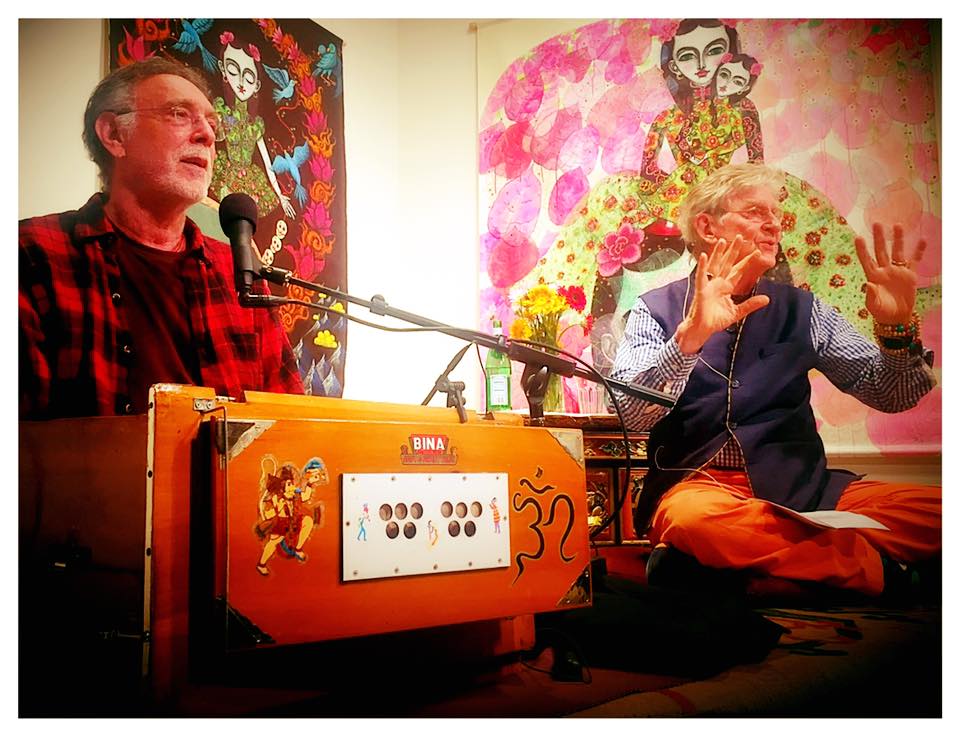
Podcast: Play in new window | Download
Subscribe: Apple Podcasts | Spotify | Amazon Music | Email | RSS
Call and Response Ep. 45 | A Meditation With Bob
“Why do we want Ram, the Divine Rama, and utter the name, Rama, which comes from a verb that means to play and to enjoy? Actually, Rama does. ‘Ramaniya’ means to enjoy something. And why do we say, ‘Jai Ram’? May Ram triumph. May the Divine triumph. Why do we celebrate that? This is India’s vision, actually, which is the vision of the goodness of the universe. India is really the garden of Eden in ancient time. The richest, most benevolent nature in Eurasia, by far. The ancient civilizations in India were the most peaceful. Everything is relative, of course, in the relative world, but they were. And so, it’s natural that from India, a reassuring prayer emanates throughout history as we know it, that the world is a beautiful thing, that the default situation, if you just let it all go, is all right, you will be embraced, you will be caught in Nirvana. You will be caught in the clear light of the void, as the Buddhists called it. You will be caught in the fundamental bliss energies, Satchidananda, as the Vedantists called it; Being, Awareness and Bliss.” – Robert Thurman
Bob: Shall we try to meditate together a little bit? I would like to lead a meditation if you’d like to go into meditative mode. Those of you who are sitting on the mat, cross-legged etcetera, you’re in good shape. Those of you who are sitting in a chair, you should try to cross your ankles and fold your hands in your lap and touch the tip of your thumbs if you can, although I sort of unorthodoxly like to link my fingers. I don’t know why. I’m not good about that.
And, any way you’re comfortable, and tuck your chin a little and your shoulders a little back so you can sit still for a little while without being uncomfortable. Now, think about your breathing. Put your attention in the flow of breath in the nostrils if you can. Your lips should be loosely closed, tongue on the roof, on the palate behind the teeth, and breathing through the nostrils if possible, and just enjoying breathing. You don’t have to count but just revel in the fact and feel happy at that fact that when you draw in breath, energy comes to you from the universe and when you draw, when you exhale breath, waste product from your physical system is embraced by the universe, especially, in this case, the glorious of plants that are there, so kind to us, producing the energy oxygen that we need, producing from the sun and then taking up the carbon that we exhale and creating their own green leaved beauty, flowers, fruits, grains, all sorts of things that we need. So the fact that you can breathe and do breathe shows that this world is there for you. And, in a way, you are helping this world. Normally, we don’t even think about it. We take it for granted. But it’s a little bit of a clue of what all the great teachers of reality have taught us about the world being a good place, actually. The world being a benevolent place. The world being a fitting place for us. Of the four noble opinions, or facts, or truths, that the Buddha taught, His basic framework, at least. He also untaught them at other times, but He was never dogmatic, but in those things that He taught, the One that is real, most real, is the third One, the truth of Nirvana. The other ones are less real, and so, in a way, the whole gift of India, why do we all love India so much? Why do we want Ram, the Divine Rama, and utter the name, Rama, which comes from a verb that means to play and to enjoy? Actually, Rama does. Ramaniya means to enjoy something. And why do we say, “Jai Ram”? May Ram triumph. May the Divine triumph. Why do we celebrate that? This is India’s vision, actually, which is the vision of the goodness of the universe. India is really the garden of Eden in ancient time. The richest, most benevolent nature in Eurasia, by far. The ancient civilizations in India were the most peaceful. Everything is relative, of course, in the relative world, but they were. And so, it’s natural that from India, a reassuring prayer emanates throughout history as we know it, that the world is a beautiful thing, that the default situation, if you just let it all go, is all right, you will be embraced, you will be caught in Nirvana. You will be caught in the clear light of the void, as the Buddhists called it. You will be caught in the fundamental bliss energies, satchidananda, as the vedantists called it, being, awareness and bliss. And this is a hard lesson, either in the Eastern direction; Chinese, Japanese, they don’t all have this view, and in the west and middle east and Europe, they also did not have this view, a very difficult one, because their life is more of a struggle. In those less-blessed areas. But India’s great gift, and the people of India, the different waves of them, the melting pot that was India, all the different world views and languages and nations; many, many nations, actually, in India, not just one, but all of them have this kind of message. So, this is what you’re meditating, just on the basis of breathing.
Ah, I can take in the ready energy that is there for me when I draw in my breath. It increases my life force, it is a life force for me outside of my skin. And my out-breathing is not giving up life force, it’s cleaning out an element that doesn’t increase my life force, a kind of waste product of carbon and, but this, the plant world around me likes that. So breathing proves to me, subliminally, that I’m, my life is something right, something real, something worthy, something desirable by the universe. And the Divine that I like is the Divine that India attained, vision of the Divine is the Divine that loves me. So, actually, contrary to what we’re kind of taught in our Western culture, that life is a struggle, a battle, that all kinds of negative things are lurking, they’re waiting for us at the macro, the micro, at all levels,the message of this divinity, of this vision of the Divine is that we are part of a field of joy, a field that’s Ramaniya, to be delighted in, to be enjoyed. And when we and our devotion, our bhakti comes from a sense of gratitude, of feeling the grace of that. So, this is the meditation, a meditation that the default, that behind the worries that nag at you, that nag at us, anxieties, the anticipations, the pains that we focus on, that we feel, behind all of that, that the depth, if we could get to the depths of the reality of it all, which is all enlightenment means, it means “knowing what is real.” Enlightenment does not mean “going into some other place.” You know? Developing some exotic strange ability of leaving, running away to something else. Enlightenment means “knowing what is real here and now about us and about our world and about others in our world.” So, this is actually quite a difficult meditation. To connect it to the mantra, Sri Ram. “Sri” means “Glory.” It means “grace.” It means, “glory.” It means, “a flow of blissful energy,” “golden blissful energy.” “Ram” means, “enjoyment of that.” So, “Sri Ram” means, “glorious enjoyment.” So, that means that Divinity knows your reality perhaps more than we do in our worrisome mind, and so we wish that divinity to concur, “Jai” our sort of state of worriness, our wrong, our ignorance-driven state of feeling isolated, alienated, lost and lonely, uncared for. So much so, maybe we don’t even care for ourselves. So, the meditation is meditating, and even if we don’t feel it right away, even if we don’t know it right away, even if it contradicts what we think we know, reality does care for us personally. It’s in the person of Rama, of Krishna, Buddha, Vishnu, Kalki, Kuruma, Dwarka, whatever, wherever it is. Many forms. So, we relax into that feeling at the deepest level is goodness, truth, beauty and the perceptions of all the difficulties is less real than that deeper level. Even death is not to be feared. Actually, death is the moment when we get closest to that deepest reality, actually. We don’t stay there because there is no place like that. It’s just when we’re most open to change, where our mind and spirit and soul has become completely free for a split second. So, it doesn’t connect to the meat puppet, what Baba Ram Das calls the “meat puppet,” therefore we call that death, because it leaves the meat puppet. And if it knew that deep reality it would not be driven to adopt a new meat puppet necessarily by, without free choice. It would only adopt one out of love because that deep reality is love. It’s an infinite energy that wants anything made of it, anything in contact with it to feel good, to be well, to feel beauty, to feel bliss. This is India’s great message, actually. All of the traditions in India teach this in some way or another. His Holiness the Dalai Lama is so honest and so beautiful. In one teaching He was doing in Delhi for many Indian devotees, He came to a place where it was scheduled, it had been requested that He give what’s called “The Blessing of Tara.” The, sort of, initiation or diksha, or blessing of Tara, introduction to Tara, the Savioress, the Messiahaess, and He said, “Ok, it’s time to do that now.” He said, “The problem is, I don’t have any blessing of Tara for you.” And there was like a feeling of sorrow at that statement, but then, lest that He get too deep, He then said, “But, you’re the ones who have the blessing of Tara. The blessing of Tara is in every single one of your own hearts. You have that blessing already. So, it’s nice when we do it like a ceremony or like a meditation together where you receive from a Guru, teacher, the Blessing of Tara, but really what it is, is it gives you the occasion, the excuse to feel that blessing within yourself that is already there.” So sweet. He’s such a sweet Being because He doesn’t want to take credit. He doesn’t want, He doesn’t personally, He doesn’t want people’s adulation. He’s not trying to somehow possess their affection. He just wants them to find in themselves this blessed grace that we all have in our deepest hearts. But we obscure it from ourselves, our culture conditions us to do so. Our habits condition us to do so. The actually really is the goal of mindfulness, in fact. Mindfulness is not just, sort of like, counting your breath or, you know, just kind of like, not thinking something. Mindfulness is being aware of your deepest self. What you really are. You’re the blessing in your soul, that is your soul, the connection to the deep, infinite, generous, gracious energy that is inexhaustibly abundant for all life, for an infinite life. Infinite beings. Infinite life. Amitayus.
The beauty of the Bhakti Tradition is, when you do this meditation, when you probe through mindful awareness in yourself, to go past a sense of anxiety, worry, pain, suffering, something opens up when you persist, when you keep reminding yourself that “I can just draw in air to nourish my life force.” Its waiting energy waits for me all around me without depriving others around me, either. I go deeper.
Then, the trick is to learn when we feel something well up within, seeming surprisingly to come out of nowhere, come out of soul space, subtle space, meaning “super subtle,” continuum space. When we feel that, we are pleased but we tend to grab at it. We want more. But strangely, when we do, that seems to cut it off. So, then the bhakti thing is, instead of grabbing at it, we give it away. We give it back. We let it just flow through us. We give it back to Rama, to Krishna, to Radha, to Sita. We give it back to Hanuman. Give it back to Tara. Give it back to Avalokiteshvara. Lokeshwara. And then, when we don’t grasp at it, but give it away, it becomes intense and again, there’s the temptation to grasp at it, which cuts it off. So, the Bhakti keeps an orientation of entering the flow, a sense of flow of grace, even though grace has already flown. But it doesn’t matter. We add our little bit by opening.
In a little while, I’ll tell you about, from the Brihadaranyaka Upanishad, the meaning of the syallable “Da.” But let’s finish the meditation. Ok. I think we can close the meditation.
Now.
Ding.
I don’t have a bell. Ding. What do you think? What do you think? Guruji. What’s that? I can’t hear you.
KD: Sing the Tara mantra.
Bob: Oh, good. Tara mantra, yes. Tara mantra. If you go in the Padam Museum or the Calcutta Museum or in the old days, all over North India, the Delhi Museum, you will find these black basalt statues with Tara in the middle. Same Tara on the wall in the dining hall there. The one with one foot down, one foot cross-legged on their left leg, cross-legged under her thigh, but her right foot is down on the lotus in front of Her, which symbolizes that She’s about to get up. And then around Her on the stele, the black basalt stele that you’ll find hundreds of them, now there might have been thousands in ancient times, there are eight scenes and the eight scenes are like, wild elephants attacking someone, tigers attacking, lions attacking, thieves attacking, floods attacking, forest fires attacking and the king, a bad king, like our bad President attacking, putting you in jail for unjustly, you know… this is called the “eight dangers.” And they say, you call on Tara to quickly, She saves you from those eight dangers, the external ones, and those also symbolize internally, you know, the elephants are an attack of delusion, and the tigers are an attack of hatred, and the poisonous snakes are an attack of jealousy and so on, so there are eight mental additions, addictive emotions that tend to disturb our peace of mind, and she will also save from those, so internal and external. And we’ll talk about that more in detail. But this was just all over North India. And you know, Buddhist, Hindu, who cares, it’s like, irrelevant. Tara, you call on Tara, “Om Tare Tuttare Ture Swaha”. “Tare” is just calling on Her. “Tara” means Savioress. Female. And “Tuttare” means, “Super Tara.” And “Ture” means “quickly” Come here quickly. And “Swaha” means “welcome” or “hail” or “so be it” or whatever, you know. “Make it happen.” Like they say in Star Trek. You know? Make it so. “Swaha” means. So, then they say, you just say that with deep faith and the lions will, you can pet the lions and the tigers, the elephants will quiet down, the thieves will leave you alone, etcetera, they claim. I know some stories about getting out of prison and so on, I’ll tell you later. Ok. Guruji.
Take it away.



